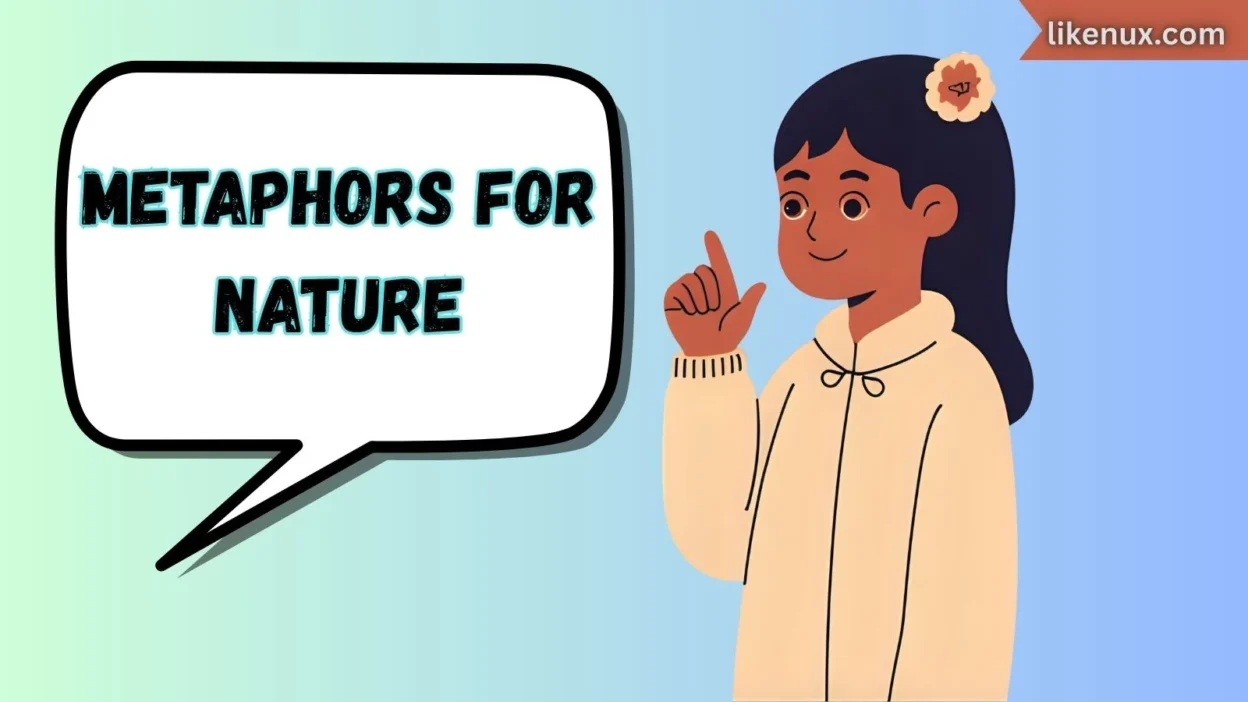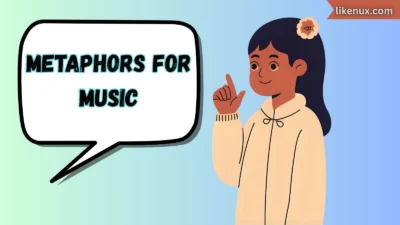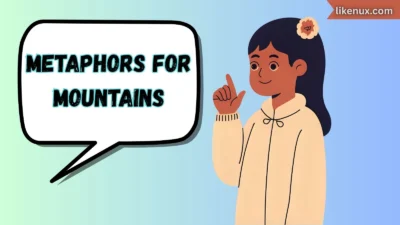Nature is more than just the trees, skies, rivers, and mountains we see every day—it is the poetry of life itself. When words fall short, metaphors allow us to capture its beauty, calmness, and power. They give us a way to describe the deep connection humans share with the natural world. Metaphors for Nature.
In this article, I’ll share 25 beautiful metaphors for nature, each explained with meaning, examples, and ways you can use them in your writing, conversations, or reflections. Having grown up surrounded by green fields and gentle streams, I’ve always felt that nature speaks its own language, and metaphors help us translate that magic into words.
1. Nature is a Mirror
Meaning: Nature reflects our moods, emotions, and life cycles.
Sentence Example: “On gloomy days, the sky feels like a mirror of my heart.”
Best Use: Great for poetry, journaling, or when describing emotional connections with surroundings.
Other Ways to Say: Reflection of the soul, echo of emotions.
Read More: Metaphors for Nervousness
2. Nature is a Mother
Meaning: It nurtures, protects, and provides life.
Sentence Example: “Nature is a mother who feeds every living being selflessly.”
Best Use: Ideal for eco-friendly talks, speeches, or environmental writing.
Other Ways to Say: Earth as a caregiver, Mother Earth.
3. Nature is a Symphony
Meaning: A harmonious blend of sounds, colors, and movements.
Sentence Example: “The forest is a symphony of birds, winds, and rustling leaves.”
Best Use: Beautiful for descriptive essays, travel writing, or nature blogs.
Other Ways to Say: Melody of life, orchestra of the wild.
4. Nature is a Teacher
Meaning: Every element of nature gives us wisdom and lessons.
Sentence Example: “A river teaches persistence as it carves valleys over centuries.”
Best Use: Motivational speeches, self-help writing, or reflections.
Other Ways to Say: Life’s guide, the silent mentor.
5. Nature is a Canvas
Meaning: It paints breathtaking views like a masterpiece.
Sentence Example: “Sunset painted the sky like a canvas of fire and gold.”
Best Use: Ideal for travel stories, photography captions, or poetry.
Other Ways to Say: Living artwork, painter’s paradise.
6. Nature is a Book
Meaning: Every season and detail tells a different story.
Sentence Example: “The autumn leaves are chapters of a story about change.”
Best Use: Great for reflective essays or environmental education.
Other Ways to Say: Nature’s diary, pages of life.
7. Nature is a Sanctuary
Meaning: A safe, healing space where peace resides.
Sentence Example: “The mountains are my sanctuary when life feels overwhelming.”
Best Use: Perfect for mental health and wellness writing.
Other Ways to Say: Sacred retreat, peaceful haven.
8. Nature is a Healer
Meaning: It restores mental, physical, and emotional well-being.
Sentence Example: “A walk through the forest heals stress better than medicine.”
Best Use: Excellent in therapy, mindfulness, or holistic health content.
Other Ways to Say: Natural doctor, soothing balm.
9. Nature is a Clock
Meaning: It shows the passage of time through cycles.
Sentence Example: “The blooming flowers mark spring like a clock’s ticking hand.”
Best Use: Great for seasonal writing or reflections on life cycles.
Other Ways to Say: Nature’s calendar, timekeeper.
10. Nature is a Stage
Meaning: A setting where life’s drama unfolds.
Sentence Example: “The forest is a stage where animals perform their daily play.”
Best Use: Perfect for storytelling, literature, or creative essays.
Other Ways to Say: Theater of life, natural performance.
11. Nature is a Blanket
Meaning: It wraps us in comfort and safety.
Sentence Example: “The fog lay over the valley like a soft blanket.”
Best Use: Use in cozy, descriptive writing or personal stories.
Other Ways to Say: Comforting wrap, protective layer.
12. Nature is a Whisper
Meaning: It speaks softly but meaningfully.
Sentence Example: “The wind is nature’s whisper reminding us to listen.”
Best Use: Great for poetic and emotional expressions.
Other Ways to Say: Quiet voice, gentle murmur.
13. Nature is a Fountain
Meaning: A source of endless renewal and inspiration.
Sentence Example: “Nature is a fountain of creativity for every artist.”
Best Use: Perfect for motivational or artistic discussions.
Other Ways to Say: Spring of ideas, source of vitality.
14. Nature is a Tapestry
Meaning: A woven mix of colors, life, and beauty.
Sentence Example: “The meadows form a tapestry stitched with flowers.”
Best Use: Ideal for descriptive and artistic writing.
Other Ways to Say: Fabric of life, woven artwork.
15. Nature is a Companion
Meaning: Always present to comfort and support us.
Sentence Example: “Even in loneliness, the stars are a constant companion.”
Best Use: Great for personal reflections and spiritual writing.
Other Ways to Say: Faithful friend, silent partner.
16. Nature is a Bridge
Meaning: It connects humans with peace and meaning.
Sentence Example: “The rainbow is a bridge between earth and sky.”
Best Use: Suitable for spiritual or emotional discussions.
Other Ways to Say: Connector, pathway.
17. Nature is a Treasure Chest
Meaning: It holds countless hidden wonders.
Sentence Example: “Every forest is a treasure chest waiting to be discovered.”
Best Use: Travel writing, adventure blogs, or storytelling.
Other Ways to Say: Hidden jewels, vault of wonders.
18. Nature is a Puzzle
Meaning: It has complex yet fascinating patterns.
Sentence Example: “The honeycomb is a puzzle crafted by bees.”
Best Use: Perfect for science, education, and reflective pieces.
Other Ways to Say: Mystery, enigma.
19. Nature is a Garden of Dreams
Meaning: A place of beauty, hope, and imagination.
Sentence Example: “The meadow felt like a garden of dreams unfolding.”
Best Use: Great for storytelling, children’s writing, and poetry.
Other Ways to Say: Dreamland, paradise.
20. Nature is a River of Life
Meaning: It sustains and moves everything forward.
Sentence Example: “The river of life flows through every living creature.”
Best Use: Spiritual, motivational, and ecological writing.
Other Ways to Say: Life stream, eternal flow.
21. Nature is a Lamp
Meaning: It lights up our path and brings clarity.
Sentence Example: “The stars are lamps guiding travelers at night.”
Best Use: Ideal for spiritual or motivational content.
Other Ways to Say: Beacon, guiding light.
22. Nature is a Crown
Meaning: It symbolizes majesty and beauty.
Sentence Example: “Snow-capped mountains wear crowns of glory.”
Best Use: Travel, storytelling, and poetry.
Other Ways to Say: Diadem, jewel of earth.
23. Nature is a Quilt
Meaning: A patchwork of different elements stitched together.
Sentence Example: “The fields and rivers made a colorful quilt from above.”
Best Use: Perfect for descriptive imagery and literature.
Other Ways to Say: Patchwork, stitched beauty.
24. Nature is a Doorway
Meaning: It opens us to new experiences and peace.
Sentence Example: “A walk in the forest is a doorway to serenity.”
Best Use: Motivational, spiritual, or self-reflective writing.
Other Ways to Say: Gateway, portal.
25. Nature is a Poet
Meaning: It writes verses in skies, rivers, and winds.
Sentence Example: “Every sunset is a poet writing with light.”
Best Use: Ideal for artistic, emotional, or inspirational works.
Other Ways to Say: Storyteller, natural artist.
FAQs
1. Why do we use metaphors for nature?
Because they help us express complex emotions and beauty in a relatable, human way.
2. How can metaphors improve my writing?
They add depth, warmth, and vivid imagery, making your words more memorable.
3. Can metaphors for nature be used in speeches?
Yes, they are powerful in motivational speeches, eco-friendly campaigns, and storytelling.
4. Which metaphor is best for emotional writing?
“Nature is a Mirror” or “Nature is a Whisper” often resonate most emotionally.
5. Are metaphors the same as similes?
No, a metaphor directly equates one thing with another, while a simile uses “like” or “as.”
Conclusion
Nature speaks in a language of silence, and metaphors are our way of giving it words. From calling it a mirror of our soul to a sanctuary of peace, these 25 metaphors remind us of the deep relationship we share with the world around us.
Personally, I’ve often felt that walking through nature is like reading poetry written by the earth itself—every breeze, flower, and stone has a story. I hope these metaphors inspire you to write, speak, and feel more deeply connected to the natural world.

Daniel Matthew is a passionate visionary who believes in creativity, purpose, and innovation. With a focus on growth and authenticity, he turns every idea into meaningful impact.



